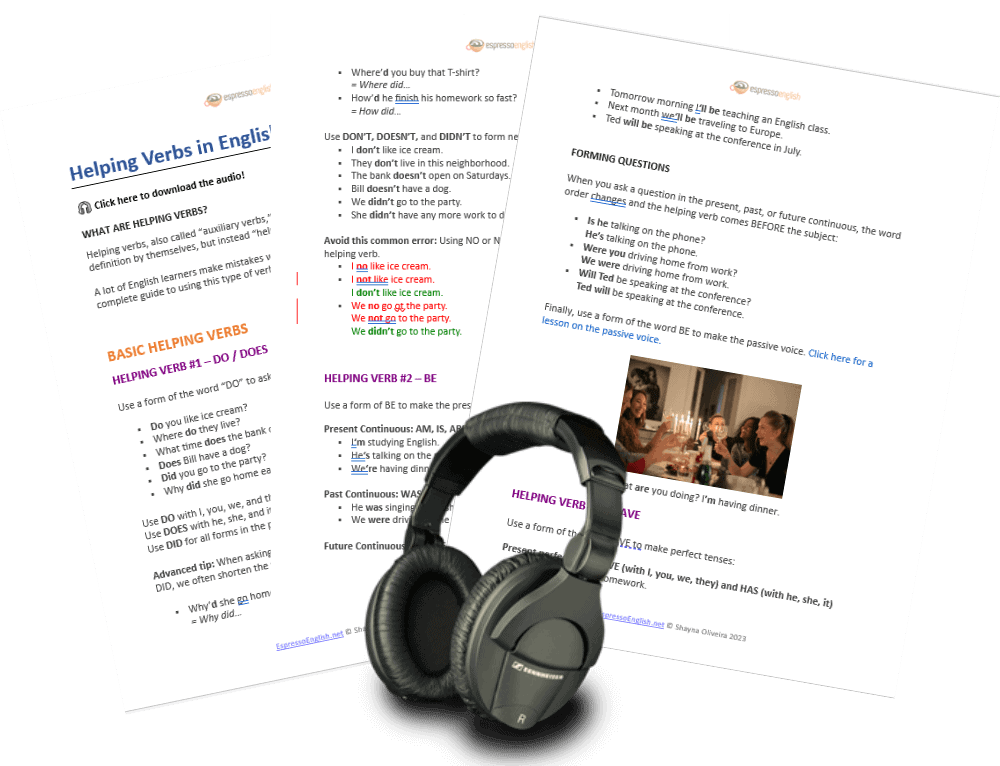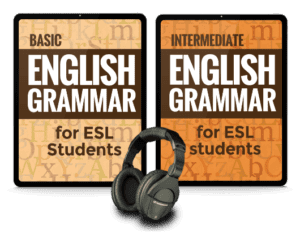
What are helping verbs?
Helping verbs, also called “auxiliary verbs,” are verbs that don’t have a specific definition by themselves, but instead “help” the main verb of the sentence.
A lot of English learners make mistakes with helping verbs in English, so here’s a complete guide to using this type of verb!
Helping Verbs List
Basic helping verbs:
Modal helping verbs:
Basic Helping Verbs
Helping Verb #1 – DO / DOES / DID
Use a form of the word “DO” to ask questions:
- Do you like ice cream?
- Where do they live?
- What time does the bank open?
- Does Bill have a dog?
- Did you go to the party?
- Why did she go home early yesterday?
Use DO with I, you, we, and they (in the present).
Use DOES with he, she, and it (in the present).
Use DID for all forms in the past.
Advanced tip: When asking questions in the past with WHY, WHERE, and HOW + DID, we often shorten the word “did” in spoken English.
- Why’d she go home early yesterday?
= Why did… - Where’d you buy that T-shirt?
= Where did… - How’d he finish his homework so fast?
= How did…
Use DON’T, DOESN’T, and DIDN’T to form negative statements:
- I don’t like ice cream.
- They don’t live in this neighborhood.
- The bank doesn’t open on Saturdays.
- Bill doesn’t have a dog.
- We didn’t go to the party.
- She didn’t have any more work to do, so she went home.
Avoid this common error: Using NO or NOT as the helping verb.
I no like ice cream.
I not like ice cream.
I don’t like ice cream.We no go to the party.
We not go to the party.
We didn’t go to the party.

Do you like ice cream? I don’t like ice cream.
Helping Verb #2 – BE
Use a form of the word BE to make the present, past, and future continuous tenses:
Present Continuous: AM, IS, ARE + -ing form
- I‘m studying English.
- He‘s talking on the phone.
- We‘re having dinner right now.
Past Continuous: WAS, WERE + -ing form
- He was singing in the shower.
- We were driving home from work.
Future Continuous: WILL BE + -ing form
- Tomorrow morning I‘ll be teaching an English class.
- Next month we‘ll be traveling to Europe.
- Ted will be speaking at the conference in July.
FORMING QUESTIONS WITH HELPING VERBS
When you ask a question in the present, past, or future continuous, the word order changes and the helping verb comes BEFORE the subject:
- Is he talking on the phone?
He’s talking on the phone. - Were you driving home from work?
We were driving home from work. - Will Ted be speaking at the conference?
Ted will be speaking at the conference.
Finally, use a form of the word BE to make the passive voice. Click here for a lesson on the passive voice.

What are you doing? I‘m having dinner.
Helping Verb #3 – HAVE
Use a form of the verb HAVE to make perfect tenses:
Present perfect: Use HAVE (with I, you, we, they) and HAS (with he, she, it)
- I‘ve finished my homework.
- She has just left the office.
- Bob and Karen have already spoken to me.
Advanced tip: In spoken English, we often shorten “he has” and “she has” to “he’s” and “she’s”:
- She’s (she has) just left the office.
- He’s (he has) borrowed my textbook.
Past perfect: Use HAD in all cases
- He said he had bought the tickets.
- We had hoped to finish early, but we didn’t.
Advanced tip: In spoken English, we often shorten “had” to ‘d
- He said he’d bought the tickets.
- We’d hoped to finish early, but we didn’t.
Future perfect: Use WILL HAVE in all cases
- By this time tomorrow, I will have finished this project.
- By the time I’m 30, I will have traveled to over a dozen countries.
FORMING QUESTIONS WITH HELPING VERBS
Again, when you ask a question with HAVE, the word order changes and the helping verb comes BEFORE the subject:
- Have you finished your homework?
I’ve finished my homework - Has she left the office?
She has just left the office. - Have Bob and Karen spoken to you?
Bob and Karen have spoken to me.
Learn more about English verb tenses here!

I‘ve finished my homework.
Modal Helping Verbs
Now that you know how to use the basic helping verbs in English, let’s learn the modal helping verbs. Modal helping verbs modify the main verb by expressing necessity or possibility.
Use CAN / COULD to express ABILITY / POSSIBILITY:
I can swim.
(I have the ability to swim)
We could go to the movies tonight.
(It’s possible for us to go to the movies tonight)
You can’t enter the restricted area.
(It’s not possible for you to enter that area)
He tried to call me, but he couldn’t get through.
(It wasn’t possible for him to speak to me)

You can’t enter this area.
Use MAY / MIGHT to express “MAYBE”
We might go camping this weekend, depending on the weather.
(Maybe we will go camping, maybe we won’t)
I may go to the gym later, if I get off from work early.
(Maybe I will go, maybe I won’t)
Click here for more details on the differences between MAY and MIGHT.

We might go camping this weekend, depending on the weather.
Use SHOULD to express a RECOMMENDATION / SUGGESTION
If your head hurts, you should go to the doctor.
(I suggest that you go to the doctor)
He should see that movie – he’d like it.
(I recommend that he see the movie)
Use MUST to express NECESSITY (something that is required)
You must arrive on time for the exam, otherwise they won’t let you take it.
(It is necessary to arrive on time)
Advanced tip: In spoken English, it’s much more common to use “need to” and “have to” and “got to” (informal) for requirements instead of MUST.
- You have to arrive on time for the exam.
- You need to arrive on time for the exam.
- You gotta (got to) arrive on time for the exam. – Informal – spoken English only!
Use WILL / WON’T to express CERTAINTY about the future
I‘ll help you write the report.
(I promise to help you write it)
That software won’t work – it’s not compatible with the computer.
(It’s certain that the software will not work)
SHALL is similar to WILL, but it is typically only used in very formal English.
Use WOULD to express a HYPOTHETICAL / IMAGINARY situation
- If I were a millionaire, I would give away a lot of my money to charity.
- Dana would study English if she had more free time.
In spoken English, WOULD is often shortened to ‘d.

If I were a millionaire, I would…
Asking Questions with Modal Helping Verbs
When you ask a question, the word order changes and the helping verb comes BEFORE the subject:
I can swim.
Can you swim?
Could we go to a movie tonight?
Yes, we could.
You should see that movie.
Should I see that movie?
I’ll help you.
Will you help me?
I would give away a lot of my money.
What would you do?
Now you know how to use basic helping verbs and modal helping verbs in English! Can you make your own example sentences with each of these helping verbs?
- Learn more: Should have, Could have, Would have
- Learn more: Modal verbs for deduction
- Learn more: State verbs and action verbs



